
The eleventh voco™ property and first in South Eastern Europe, is located on the fringe of popular Podgorica and re-branded under IHG’s newest upscale brand, offering a modern, stylish and unstuffy hotel experience for guests. The 81-room hotel embodies the characteristics of voco™ with exclusive features and distinctive hallmarks, setting it apart for a memorable stay. Located just outside of the historic capital city of Montenegro, the hotel is surrounded by rugged mountains and is close to Skadar Lake National Park, an area noted for its diversity of flora and fauna. Every guest will experience the voco™ signature ‘come on in’ warm welcome, promising a swift and simple check in, with dedicated voco™ hosts available throughout the guest’s stay as resident experts, and a locally inspired welcome treat, a traditional nut cake. Inspired by its surroundings, voco® Podgorica takes local influences and blends it with contemporary interiors throughout to hotel to leave guests with a lasting impression. The refurbished guest rooms benefit from the voco™ design concept with thoughtful comforts like cosy bedding made from 100% recycled materials, Korres amenities in larger dispenser bottles, and fast Wi-Fi so guests can relax and indulge in some ‘me time’ when they stay at voco™ hotels. Guests can enjoy a taste of ‘voco™ life’ with delicious, locally inspired dishes at the hotel restaurant or unwind over drinks in the peaceful surroundings of the lobby bar with friends and family. For those looking for pure relaxation, the hotel wellness and spa club featuring an Olympic half size pool, gym, spa and treatment rooms as well as a newly built sports hall offering a wealth of opportunities to unwind. For those looking for an alternative space for meetings, voco® Podgorica is the ideal venue for corporate events. With 3 versatile meeting rooms, the hotel can adapt to suit your needs whether you need to host a conference or simply require a room for a team outing. A designated onsite event planner will support you from booking to event day to ensure an unstuffy and smooth-running event. Milena Brajovic, General Manager, voco® Podgorica said: “We are excited to be the first voco™ property to open in South Eastern Europe. Our hotel offers guests the opportunity to relax in a rural setting whilst only being a short distance from a truly historical and beautiful city. voco™ is all about delivering great guest experience and we look forward to offering a warm welcome to guests, old and new, when they choose to stay with us.” The hotel guest rooms benefit from the voco™ design concept, which includes sustainable initiatives to help guests sleep easier. voco™ bedding is made from 100% recycled materials, with an estimated 150 plastic bottles recycled per guest room through bedding alone. In addition, miniature bottles have been removed from the hotel, and have been replaced with bulk size Korres products in large-format bottles which produce 80% less waste than miniatures. Glass water bottles mean that the hotel remove an average of 300 plastic bottles in every guest room per year and the hotel also provides aerated shower heads in their bathrooms to reduce water usage.
Create: Jan 7, 2020 Edit: Jan 7, 2020
Bedsonline confirms strong growth in room night sales as a result of new brand identity and proposition launch in January 2019, up by around 40% year-on-year. Following integration of GTA and Tourico Holidays into parent group, sister brand TravelCube’s customers migrated onto Bedsonline’s class-leading booking platform in January – increasing from 55,000 to 180,000 the number of hotel properties available. Australia is the 3rd biggest source market for the combined Hotelbeds and Bedsonline brands’ Asia-Pacific and 7th biggest globally, up from 8th place last year. Bedsonline to organize a ‘famil’ trip for Pacific top travel agents in 2020. Bedsonline, the leading global provider of accommodation and complementary travel products exclusively for travel agents, has today confirmed strong growth in Australia. According to Bedsonline’s booking data, since the launch of the new brand identity and value proposition in January 2019 the number of room nights sold from the Australia source market has grown by approximately 40% year-on-year. As a source market Australia remains the combined Hotelbeds and Bedsonline brands’ 3rd biggest source market in the APAC region and the 7th biggest source market for the company globally, up from 8th place last year. This growth has been driven by the new value proposition of Bedsonline, following the integration of GTA and Tourico Holidays into Bedsonline’s parent group and sister brand TravelCube’s customers migrating earlier this year onto Bedsonline’s class-leading booking platform. The new and enhanced platform now gives travel agents a powerful and user-friendly technology, along with local support, plus a diverse and competitive product portfolio – increasing from 55,000 to 180,000 the number of hotel properties available, whilst also providing 24,000 transfer routes and 18,000 activities, plus 140,000 cars available for hire. To continue this growth Bedsonline plans to host 20 travel agents from the Pacific region for a ‘famil’ trip in 2020, details of which will be published soon. The purpose of this trip is to acquaint travel agents with the services and offerings of Hotelbeds’ partner hotels in the chosen destination. Peter Jones, Regional Sales Manager, Pacific at Bedsonline commented: “I am very proud to see the outstanding sales growth in Australia this year. The result has been driven by our new and enhanced platform but is also a reflection of our hard work and persistence in the Pacific region and I´d like to congratulate every team member – as well as, of course, all our travel agent clients for their loyalty. “In particular we are very glad to hear the positive feedback from our travel retailers on the new enhanced offerings, improved payment options, operational support and loyalty rewards program. We are committed to being the ultimate partner for travel businesses and in 2020 will be working harder than ever.” “To maintain our success and growth we are going to hold, for the first time, a ‘famil’ trip for the top agent from a selection of our different clients. We want to give them a first-hand experience of the portfolio of accommodation, activities, and transfers that we work with in the destination. Such trips are invaluable for travel agents so that they can then give their customers that genuine personal advice.”
Create: Jan 7, 2020 Edit: Jan 7, 2020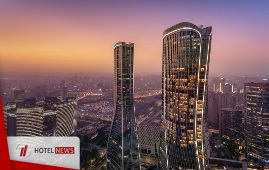
Hotel industry and travel news from around the Asia Pacific region: Adventure travel on the rise in China, Silkari acquires management rights of Oaks Lagoon in Port Douglas and more... Hana Financial Investment and Hotel Lotte to Acquire The Hotel at The Mark for USD175 Million Korean-based brokerage firm, Hana Financial Investment Company Limited (“Hana”), and Korea-based hospitality company, Hotel Lotte Company Limited (“Hotel Lotte”) have acquired the 189-key The Hotel at The Mark from US-based private equity firm, Stockbridge Capital Group, under a 70:30 real estate investment trust, for USD175 million. The luxury hotel is part of a 44-story F5 Tower in downtown Seattle and occupies the lower 16 floors. Subsequent to the acquisition, the hotel is set to open under the brand name of Lotte Hotel Seattle in June 2020. The acquisition is part of Hotel Lotte’s effort to expand abroad to better compete with global hotel chains. Silkari Acquires Management Rights of Oaks Lagoon in Port Douglas Australia-based luxury accommodation brand, Silkari Hotels (“Silkari”), has acquired the management rights of 175-key Oaks Lagoon in Port Douglas for an undisclosed price. Located approximately 50-minutes north of Cairns International Airport, the high-end apartment complex is set in a tropical complex around six lagoon-style pools. Previously managed by Thailand-based Minor Hotel Group, the property also features lap pool, fitness centre, tennis courts, a restaurant and bar, spa and conference facilities. Following the acquisition, Silkari will rename the property as Silkari Lagoons. Oak Lagoon is Silkari’s third accommodation asset, joining the 212-key Silkari Suites at Chatswood and Silkwood by Silkari, a 219-key and 37-townhouse complex in Pagewood, in Sydney's eastern suburbs. Dexus and Queensland Government Agree on AUD2.1 Billion Project in Australia The Queensland government and Australia-based real estate investment trust company, Dexus, has signed a facilitation agreement on a proposed AUD2.1 billion Waterfront Brisbane concept master plan. The Waterfront Brisbane development seeks to transform Brisbane’s Eagle Street Pier into a premier and leisure destination. Some key developments of the proposal plan include two premium office and mixed-use towers on the Eagle Street Pier site, as well as riverfront restaurants, casual dining places and retail units. The development will also feature a revitalised public realm which measures approximately 7,900 square metres of open space. Wharf facilities supporting commercial and river tourism operations will also be upgraded to support the delivery of a new City Reach ferry terminal. Construction on the Eagle Street Pier site is expected to commence in 2022 and the first tower to be delivered in 2026. India-based Park Hotels Files Draft Papers for INR10 billion Initial Public Offering India-based Apeejay Surrendra Park Hotels, which operates luxury boutique hotels under ‘The Park’ brand in India, has filed its draft red herring prospectus (“DRHP”) for an INR10 billion initial public offering (“IPO”). The IPO comprises a fresh offer of INR4 billion and an offer-for-sale (“OFS”) of up to INR6 billion by its existing investors and promoters. The net proceeds of the IPO will be utilized to repay debt and for general corporate purposes. The company currently manages 22 hotels with 1,937 rooms across 15 cities in India. As per the DRHP, it has a pipeline of 1,536 rooms expected to begin operations within the next three years. The company also has a retail food and beverage business under the ‘Flurys’ brand, which operates 38 outlets in Kolkata, and one outlet each in Navi Mumbai and New Delhi. Adventure Travel on the Rise in China According to a recent report, adventure travel as a kind of burgeoning outdoor tourism has gained increasing popularity among Chinese people who enjoys unique, fresh and exciting experience. As Chinese tourists become wealthier and more experienced, they show a growing desire to explore the world and try more adventurous activities such as climbing, diving, caving, sailing, paragliding, cycling and hiking. Estimated data from market consulting firm, Allied Market Research, showed that the global adventure tourism market was valued at USD586 billion in 2018 and is projected to reach around USD1.63 trillion in 2026. Chinese travellers are playing an increasingly important role in the global adventure tourism economy. According to China Adventure Association, there are 130 million to 170 million Chinese people participating in outdoor adventures, with annual growth of around 15%.
Create: Jan 7, 2020 Edit: Jan 7, 2020
New YouGov data shows one in five tourists are now more interested in visiting Saudi Arabia for a vacation and according to the Saudi Commission for Tourism and National Heritage, China, UK, Malaysia, United States and Canada top the list of new arrivals since the launch of its first tourism visa. New YouGov research has identified a rise in tourism interest in Saudi Arabia from around the world, with one in five tourists more likely to visit Saudi Arabia for a vacation now than five years ago. The YouGov research surveyed 9,521 people across the USA, China and five key markets in Europe, revealed a growing interest in visiting Saudi Arabia. The data coincides with the Saudi Commission for Tourism and National Heritage (SCTH) revealing its top inbound source markets since Saudi Arabia's opened its doors to international tourism. Since the launch of the new tourism visa in September, visitors from China, UK, Malaysia, United States and Canada have topped the list of new arrivals welcomed into Saudi Arabia. Saudi's historic sites appear to be an important attraction for tourists to the Kingdom. Amongst those surveyed by YouGov, over one in five (22%) are keen to visit Jeddah's historic old town, a UNESCO World Heritage Site. Meanwhile, another UNESCO site, previously only known to a few travellers, is gaining a following amongst Chinese millennials. Al Ula now tops the list of destinations in the Arab world of a third of Chinese tourists under the age of 35. Italians top the list with 35% surveyed saying they would be more likely to visit Saudi Arabia following the new visa launch. British tourists were 15% more likely just ahead of Americans at 14%. The research also points to new opportunities for multi destination tourism growth. Of all respondents 73% reported a preference to visit several destinations rather than stay in one location. Arab League Tourism Ministers Meeting The research is released as Saudi Arabia takes on the presidency of the Arab League Tourism Ministers Meeting at the end of a historic year for the Kingdom. Tourism Ministers from across the Arab world met earlier this month for the 22nd Annual Arab Tourism Ministers Meeting. During the meeting they discussed opportunities for regional-wide tourism offerings and unified strategies for sustainable growth of the sector to benefit local communities and the environment. His Excellency Ahmad bin Aqil Al Khatib Chairman of the Board of Directors of the Saudi Commission for Tourism and National Heritage (SCTH) said: "This year marked the historic moment of Saudi Arabia opening its doors to the world. We are welcoming more visitors and investors than ever before. To those thinking of visiting Saudi Arabia in 2020, you won't find a warmer welcome anywhere in the world."
Create: Jan 6, 2020 Edit: Jan 6, 2020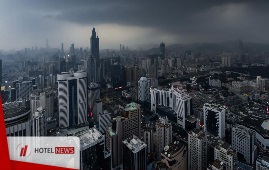
The South East Asia (Indonesia, Malaysia, Myanmar, Philippines, Singapore, and Vietnam) lodging industry experienced mixed sentiments for 2019. Despite growth in tourism arrivals, the ever-changing political climate, mercurial global economic conditions, and growth in accommodation supply are few of the many reasons that continue to put downward pressure on several markets. Even with the headwinds, the underlying dynamics behind demand growth appear to be resilient and are expected as such going forward. The global economic growth is anticipated to end off at a rate of 3.0% in 2019, before gradually recovering back to the 2018 performance of 3.6% in 2021. Nonetheless, South East Asia remains the fastest-growing region in the world and is projected to grow at a rate of 5% in 2019. While the global Consumer Price Index (CPI) forecast remains relatively stable, South East Asia’s CPI has been projected to abate from 3.4% in 2018 to 2.8% in 2019, mainly held back by slow wage growth and prolonged trade tensions. However, South East Asia’s unemployment rate remains at a low 3.5% and is expected to prevail at the same level through 2021. The region’s inflation is anticipated to rise in 2021 on the back of looser monetary conditions and resilient domestic demand. As of year-to-date (YTD) Q3 2019, South East Asia registered a growth rate of 12.3% in international visitor arrivals, a 2.1% increase from the same time last year. While Malaysia recorded year-over-year (YOY) growth of 3.7% as of YTD September 2019, a five-year compound annual growth rate (CAGR) of 0.1% reveals that the country continues to miss tourism goals and struggles to attract more tourists. The South East Asia (Indonesia, Malaysia, Myanmar, Philippines, Singapore, and Vietnam) lodging industry experienced mixed sentiments for 2019. Despite growth in tourism arrivals, the ever-changing political climate, mercurial global economic conditions, and growth in accommodation supply are few of the many reasons that continue to put downward pressure on several markets. Even with the headwinds, the underlying dynamics behind demand growth appear to be resilient and are expected as such going forward. The global economic growth is anticipated to end off at a rate of 3.0% in 2019, before gradually recovering back to the 2018 performance of 3.6% in 2021. Nonetheless, South East Asia remains the fastest-growing region in the world and is projected to grow at a rate of 5% in 2019. While the global Consumer Price Index (CPI) forecast remains relatively stable, South East Asia’s CPI has been projected to abate from 3.4% in 2018 to 2.8% in 2019, mainly held back by slow wage growth and prolonged trade tensions. However, South East Asia’s unemployment rate remains at a low 3.5% and is expected to prevail at the same level through 2021. The region’s inflation is anticipated to rise in 2021 on the back of looser monetary conditions and resilient domestic demand. As of year-to-date (YTD) Q3 2019, South East Asia registered a growth rate of 12.3% in international visitor arrivals, a 2.1% increase from the same time last year. While Malaysia recorded year-over-year (YOY) growth of 3.7% as of YTD September 2019, a five-year compound annual growth rate (CAGR) of 0.1% reveals that the country continues to miss tourism goals and struggles to attract more tourists. Vietnam achieved the highest CAGR of 15.4%, followed by Indonesia (12.4%) and Myanmar (9.2%). The strong tourism demand has been driven by an increase in flight connectivity and concerted tourism efforts by the government, such as easing of visa restrictions, developing infrastructures, supporting tourism enterprises, and the promotion of tourism campaigns. Looking forward, the Indonesian government has actively promoted its "10 New Balis" program, established in 2018, to develop and promote several destinations beyond Bali, including Mandalika in West Nusa Tenggara, Thousand Islands in Jakarta, Tanjung Lesung in Banten, Tanjung Kelayang in Bangka Belitung, Borobudur Temple in Central Java, the Bromo Tengger Semeru National Park in East Java, Labuan Bajo in East Nusa Tenggara, Wakatobi in Southeast Sulawesi, and Morotai in North Maluku. In conjunction with Visit Malaysia 2020 (VM2020), Tourism Malaysia has recently launched a digital initiative, the VM2020 Website Campaign, which aims to entice and showcase various destinations in the country to more tourists. In early 2019, the Myanmar government launched the Myanma Tourism Bank to spur development in its growing tourism sector by offering low interest loans to tourism enterprises. In the Philippine government’s National Tourism Development Plan, the country seeks to spur growth and development through foreign direct investment by showcasing attractive areas in the Tourism Enterprise Zones. Singapore has also announced mega projects to fuel long-term tourism including the Greater Southern Waterfront development, Mandai eco-tourism hub, Jurong Lake District’s seven-hectare tourism development, and the expansion of the two integrated resorts. Apart from an effort to further develop less well-known tourist sites and diversify tourism products, Vietnam will soon launch a new tourism marketing campaign, #VietnamNOW, to build awareness of the country’s tourism assets andevents. Vietnam achieved the highest CAGR of 15.4%, followed by Indonesia (12.4%) and Myanmar (9.2%). The strong tourism demand has been driven by an increase in flight connectivity and concerted tourism efforts by the government, such as easing of visa restrictions, developing infrastructures, supporting tourism enterprises, and the promotion of tourism campaigns.
Create: Jan 6, 2020 Edit: Jan 6, 2020
Embassy Suites by Hilton, a global brand of upscale, all-suite hotels from Hilton (NYSE: HLT), announced today the opening of a new hotel located in the Jonesboro area. Owned by Jonesboro Hotel Partners LLC and professionally managed by O’Reilly Hospitality Management LLC, the hotel is perfectly situated to allow guests easy access to businesses, shopping and entertainment. Embassy Suites by Hilton prides itself on offering guests an approachable and stress-free experience at each of its spacious, all-suites hotel properties. The stunning Embassy Suites by Hilton Jonesboro Red Wolf Convention Center is conveniently located on the Arkansas State University campus next to First National Bank Arena and Centennial Bank Stadium. The hotel is less than 10 minutes away from the Mall at Turtle Creek, Sage Meadows Country Club and Golf Course and attractions of downtown Jonesboro. Offering 203 of Embassy Suites by Hilton’s traditional upscale two-room suites, the hotel features a luxurious, warm lobby and bar area with unique water features, as well as Houlihan’s Restaurant, which serves delicious American cuisine on property. “Embassy Suites by Hilton is committed to exceeding guests’ expectations through value-added amenities and spacious suites,” said Alan Roberts, global head, Embassy Suites by Hilton. “Whether travelers are visiting a student, taking a tour, catching a football game at Arkansas State University or simply taking in the natural beauty of Jonesboro, they will be thrilled with our latest hotel that delivers all they love about the brand at an unbeatable location.” Embassy Suites by Hilton Jonesboro Red Wolf Convention Center welcomes guests to spread out in its spacious suites and enjoy a free, cooked-to-order breakfast each morning, complimentary Wi-Fi for Hilton Honors members and free drinks and snacks each night at the manager’s Evening Reception. Embassy Suites by Hilton provides customer service that always anticipates travelers’ needs and delivers what matters most. “We are very excited for Embassy Suites, Red Wolf Convention Center and Houlihan’s Restaurant to serve as a ‘living laboratory’ for Arkansas State University (ASU) that will be the hub for internships and hands-on learning opportunities for multiple aspects of the business and marketing schools, as well as the centerpiece in the development of ASU’s hospitality program,” said Tim O’Reilly, CEO of O’Reilly Hospitality and an owner of the hotel. “Our partnership with Arkansas State University and the City of Jonesboro is a very positive relationship for our company and all parties involved.” Additional hotel amenities include 40,000 sq. ft. of meeting space, including the 15,000-sq.-ft. Arvest Ballroom (the largest ballroom in Northeast Arkansas), a 24-hour convenience store, business center, fitness center and an indoor pool. Each suite is equipped with complimentary Wi-Fi, a living area, coffeemaker, microwave, mini refrigerator and two HDTVs with movies for guests to stay entertained. Embassy Suites by Hilton Jonesboro Red Wolf Convention Center is part of Hilton Honors®, the award-winning guest-loyalty program for Hilton’s 17 distinct hotel brands. Hilton Honors members who book directly through preferred Hilton channels have access to instant benefits, including a flexible payment slider that allows members to choose nearly any combination of Points and money to book a stay, an exclusive member discount that can’t be found anywhere else and free standard Wi-Fi. Members also enjoy popular digital tools available exclusively through the industry-leading Hilton Honors mobile app, where Hilton Honors members can check-in, choose their room and access their room using a Digital Key.
Create: Jan 4, 2020 Edit: Jan 4, 2020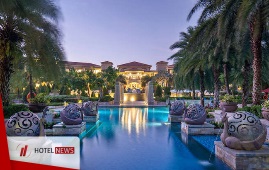
JW Marriott, part of Marriott International, Inc., today announced the opening of JW Marriott Sanya Haitang Bay, located on the Haitang Bay, the National Coast of China. The property marks JW Marriott’s second resort on Hainan and eighteenth hotel in Greater China, seamlessly blending in with the lush landscape of Haitang Bay and illustrating the beguiling charm of the entire coast. Adjacent to Yalong Bay National Tourism Resort, Haitang Bay boasts stunning scenery including tropical forests, white sandy beaches and shimmering waters. A 40-minute drive from Sanya Phoenix International Airport, the area is home to numerous tourist attractions including Wuzhizhou Island, Sanya Haichang Fantasy Town, Nanshan Temple and the Wanda International Cinema, among others. The new JW Marriott Sanya Haitang Bay is located on a 21.8-kilometer-long shoreline, providing a luxury escape for travelers who come to feel present in mind, nourished in body and revitalized through the brand’s curated programming. “We are truly delighted to continue to expand our brand portfolio in Sanya, China.” said Mitzi Gaskins, Vice President & Global Brand Leader, JW Marriott. “JW Marriott Sanya Haitang Bay is bringing a modern, luxurious setting to our guests in Sanya, as well as encouraging them to embrace the present and savor life to the fullest in a mindful and nourishing environment.” Inspired by the theme of ‘stone’, the subtle design by Smallwood, Reynolds, Stewart, Stewart (SRSS) connects guests at JW Marriott Sanya Haitang Bay with nature through endless arcades, ceramic accents, an octagonal fountain and peacock pavilion that reflect the hotel’s luscious backdrop. The property’s 142 guestrooms and 18 villas, ranging from 735 sq. ft. to 7,180 sq. ft., feature private balconies and combine modern designs with genuine aesthetics to create the optimum sense of relaxation. Two exquisite dining facilities ensure the ultimate epicurean experience for travelers. Guests can enjoy live cooking presentations in JW Kitchen’s all-day open-kitchen restaurant or relax in the tropical ambiance of the JW Lounge, featuring signature cocktails and wines from around the world. Additionally, JW Marriott Sanya Haitang Bay highlights its commitment to naturally-inspired dining through its JW Garden to offer fresh, local ingredients for authentic farm-to-table dining experiences, hands on cooking classes and specialty drinks. JW Marriott Sanya Haitang Bay is the perfect venue for hosting romantic weddings, corporate meetings and special events with over 37,600 sq. ft. of meeting space, 86,000 sq. ft. of outdoor lawn, flexible seating solutions and comprehensive business facilities. Guests can rejuvenate at the fully-equipped Health Club featuring over nine different-sized pools, or enjoy pampering at the luxurious Spa by JW. “The increase and transformation of the tourism market within China and specifically Hainan is significant, with the island now housing 23 hotels, covering different lifestyle needs,” said Henry Lee, President, Greater China, Marriott International. “The expansion of the JW Marriott brand in Sanya allows us to add unique offerings and enriching, thoughtfully-curated experiences for guests, leaving them with unforgettable memories.”
Create: Jan 4, 2020 Edit: Jan 4, 2020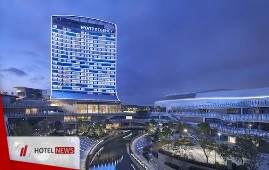
Hyatt Hotels Corporation (NYSE: H) today announced the opening of Hyatt Regency Hengqin in Zhuhai, Guangdong Province, China. With 493 rooms, six dining outlets, and 40,440 square feet (3,757 square meters) of event space, the hotel is designed for business and leisure guests alike seeking a seamless, intuitive experience in the city. Situated in the heart of the dynamic and fast-growing Greater Bay Area of southern China, Hyatt Regency Hengqin is part of the vibrant Novotown complex, which features an impressive array of attractions including Lionsgate Entertainment World, Natinoal Geographic Explorer and more. The hotel is also within easy reach of the Hong Kong – Zhuhai – Macau Bridge, offering convenient access for guests traveling throughout the region. “We are thrilled to announce the opening of Hyatt Regency Hengqin,” said William Yuen, general manager of Hyatt Regency Hengqin. “As a new, international branded hotel in Hengqin, Zhuhai, we are excited to offer superior comfort and excellent service at a convenient location.” Guestrooms Hyatt Regency Hengqin has a total of 493 guestrooms, including 55 suites, ranging from and from 430 to 2,583 square feet (40 to 240 square meters). Subtle design touches include soft warm timber blinds, giving an overall feeling of natural comfort. Regency Club guests enjoy exclusive access to our club lounge offering a range of complimentary amenities including concierge service, private check-in and check-out, delicious bites served daily, and a dedicated meeting room. Drinking and Dining Boasting six restaurants and bars, the hotel offers a wide range of global cuisine. Market Café is a self-service, market-style restaurant where diners can watch their food being prepared by expert chefs at live cooking stations. La Cucina is an extension of Market Café, bringing the delicious flavors of Italy to Hengqin, with a variety of popular European dishes. The Lounge provides a relaxed atmosphere to decompress and features a vast selection of specialty teas, coffees, cocktails and snacks. In early spring of 2020, the hotel will open three additional food & beverage outlets. Xiang Yue Chinese restaurant will specialize in the delicate flavors of Cantonese cuisine. The restaurant will feature an open kitchen, reminiscent of a hawker-style eatery, allowing diners to watch chefs prepare dishes to order. With a series of fish tanks showcased throughout the dining space, the menu highlights fresh seafood and top-quality ingredients. Pool Pavilion will be a relaxing, al fresco dining venue delivering sumptuous barbecue and craft cocktails. The 180° rooftop bar, will be located on the 23rd floor, offering with a 180° outdoor landscape and stunning views. Here, visitors can enjoy the charm of Hengqin under the stars with wine, cigars and music. Meetings & Events Whether hosting a wedding, product launch, large-scale conference, or an intimate meeting, event planners will find their every need catered for at Hyatt Regency Hengqin. The hotel boasts a total of 40,440 square feet (3,757 square meters) of event space, including the 17,437 square foot (1,620 square meter) Regency Ballroom, which features an outdoor garden, floor-to-ceiling windows, natural lighting, and can accommodate up to 1,300 guests. The Regency Salon, a premium event venue with 10,258 square feet (953 square meters) of space, offers two open kitchen display areas. Three additional multipurpose rooms provide an ideal space for small groups and meetings.
Create: Jan 4, 2020 Edit: Jan 4, 2020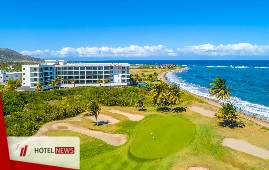
Hilton (NYSE: HLT) announced the opening of KOI Resort Saint Kitts, Curio Collection by Hilton, representing the brand’s debut in St. Kitts and Nevis, which will also be KOI Hospitality’s first entry into the hotel space. The 102-room oceanfront haven is the latest addition to Curio Collection by Hilton, reinforcing the growth of its portfolio of one-of-a-kind hotels and resorts in premier destinations across the Caribbean and Latin America. Meaning ‘love’ in Japanese, the ‘KOI’ name was the inspiration behind the love and care that was put into the property, including the resort’s meticulously appointed guest rooms, delectable cuisine and poolside programming. Situated along Half Moon Bay and adjacent to the Royal St. Kitts Golf Club, KOI Resort Saint Kitts will launch a new lifestyle, vibe and frame of mind for those visiting the destination by offering Asian-inspired design, locally-inspired programming, globally celebrated cuisine by KOI Hospitality and immeasurable experiences for travelers. “Rapidly evolving into a high-end tourist destination in the region, St. Kitts has experienced a spike in tourism this year with arrivals booming 14.5 percent higher over the same period last year,” said Juan Corvinos, vice president, development, Caribbean and Latin America, Hilton. “Now growing at one of the fastest rates in the Caribbean, we recognize the demand for upscale accommodations, intuitive service and authentic experiences in this market. We look forward to providing travelers with a one-of-a-kind experience that can’t be found elsewhere on the island, as we continue to expand Curio Collection by Hilton’s presence globally reaching more than 80 properties.” Set on prime beachfront property, KOI Resort Saint Kitts is nestled on the quiet and secluded island of Saint Kitts with 102 guestrooms, a full-service pool terrace overlooking the ocean, a well-equipped gym and bespoke spa treatments, and a variety of elevated dining options, including the famed KOI Restaurant. The hotel is located within the “Cradle of the Caribbean” where the Atlantic Ocean meets Caribbean Sea. “KOI is one of the world’s largest hospitality brands and most iconic, offering memorable experiences in LA, Las Vegas, New York, Bangkok and Abu Dhabi,” said Nick Haque, CEO of KOI Hospitality Group. “Today is a dream come true for our evolving brand as we open the first KOI Resort on the beautiful island of Saint Kitts. Our new oasis will retain the same vision of our restaurants with design that appeals to all the senses.” Every detail of the property was curated by the KOI Hospitality executive team, creating guest experiences at the highest quality standard, providing a sanctuary for locals and visitors alike. Highlights include: Thoughtful Design Upon arrival, the sensory experience begins as guests are greeted by the sound of water and an unparalleled view of the lush island landscape and ocean. With a striking yet minimalistic design, the lobby interiors were inspired by the majestic and zen vibe reminiscent of Southeast Asia. The eye-catching and bold façade is an artistic mélange of soothing white and beige which gives way to the modern and sleek lobby adorned with handcrafted details, rich textures and unique pieces of art inspired by the local culture. Each guestroom includes plush furnishings with neutral tones and a minimalistic approach to room decor. Guestrooms feature floor-to-ceiling windows leading out to a tranquil terrace with panoramic views of the ocean, golf course or nearby mountain range. Each room boasts a variety of signature design elements and luxurious amenities include soothing rain showers, relaxing bathtubs, lavishly appointed beds and other modern comforts. Experiential Amenities With a dreamscape design embracing the natural beauty of the island throughout every facet of the resort, guests can unwind at the resort’s pool situated mere steps from the ocean on plush lounge beds within the resorts’ expansive pool terrace, which boasts views of the crystal blue waters that blend seamlessly into a vibrant blue sky. Notable amenities include the Kaya Spa, with a wide variety of body treatments, massages and facials in a tranquil setting. Other activities include an on-site fitness facility at the well-appointed Kaya Wellness. Globally Celebrated Dining Options Recognized internationally as a culinary hotspot for celebrities and globetrotters, the KOI brand is known for elevating food and hospitality to an art form. At KOI Resort, guests are welcomed by three culinary concepts, offering a genuine sense of style, haute cuisine and service. Culinary outlets include: KOI Restaurant – The highly acclaimed KOI Restaurant brand brings its signature restaurant to St. Kitts featuring sultry Asian-influenced design and delectable Japanese-inspired cuisine. KOI Saint Kitts is a sophisticated blend of modern elegance and Asian tradition. The candle lit dining room offers a zen design of earth-toned colors and sleek lines. Notable menu items include the KOI crispy rice and the Miso Bronzed Cod, as well as a variety of signature rolls including a baked crab roll and sunfire roll. Jaya Kitchen & Cocktails – As the resort’s poolside bar and restaurant, Jaya offers beach-inspired entrees and snacks such as salads, grilled sandwiches, brick-oven pizzas and fresh seafood and sushi. Guests are also welcome to enjoy craft cocktails, fine wines and beers from a curated selection of both local and imported brands. Jaya Ultra Lounge – For those looking for a sexy night of cocktails and vibrant scenery, Jaya Ultra Lounge serves a menu of Caribbean-inspired libations and customized craft cocktails. Guests can sample a flight of locally-sourced Caribbean rum while grooving to a modern soundtrack while watching the sun goes down. Meeting, Events and Weddings Ideal for intimate celebrations and functions, KOI Resort Saint Kitts offers an exquisite backdrop for a barefoot soiree followed by an elegant poolside reception or formal seated dinner overlooking the ocean. Those looking to host small corporate meetings, executive retreats and incentive groups can also take advantage of the unique venues and experiences available at a boutique-style hotel. Beyond redefining the resort experience for leisure guests, the property applies the same high-touch experience for the meetings and events market, with more than 6,000 square feet of total function space and state-of-the-art meeting facilities for up to 300 guests. Experiences and Cultural Immersion In addition to on property activities including water sports and state-of-the-art health/wellness offerings, guests have the option to explore the destination in style by renting a catamaran to sail to Nevis, snorkeling at Dieppe Bay Beach and ziplining the island’s lush forests. The resort is just minutes away from the St. Kitts & Nevis International Airport, Brimstone Hill Fortress National Park (a UNESCO World Heritage Site), Caribelle Batik and Mount Liamuiga. “With air arrivals increasing 15 percent1 in the first two months of 2019, St. Kitts & Nevis is a focal point in the expansion of Curio Collection to destinations where tourism continues to flourish,” said Jenna Hackett, global head, Curio Collection by Hilton. “With the opening of KOI Resort Saint Kitts, we look forward to introducing travelers to the unexpected and authentic Curio Collection experience that embodies the island’s local culture.” Hilton currently has a portfolio of more than 150 open hotels and resorts to welcome travelers in the Caribbean and Latin America. In its 100th year, the company continues to pursue additional growth opportunities in the region and currently has a robust pipeline of approximately 95 hotels throughout the region, including nearly 20 throughout the Caribbean.
Create: Jan 4, 2020 Edit: Jan 4, 2020
NewcrestImage continues to add to its portfolio with the opening of a 91-room, 4-floor Hyatt Place in western Amarillo. This is the company’s fourth hotel in Amarillo, with a total of 514 rooms in operation in the city. The Hyatt Place is the second property of a three-hotel, 300-room “hotel campus” located on a five-acre site. The other hotels are a 90-room, 4-floor Tru by Hilton that opened in August of 2018 and a 90-room, 4-floor Aloft, a Marriott brand, that is scheduled to begin construction by mid-year of 2020. The hotel complex is located in the heart of the city’s medical district at the intersection of I-40 Frontage Road and South Soncy Road, which the Texas Department of Transportation describes as among Amarillo’s busiest junctions. “We offer travelers three distinctive hotel experiences and styles at a single, high-visibility, high-traffic location,” explained Mehul Patel, Chairman and CEO of NewcrestImage. The company owns and operates two other properties in Amarillo, both in the dynamic downtown area: an award-winning 107-room, 10-floor Courtyard by Marriott that opened in 2011 in the city’s historic Fisk Building and a 226-room, 6-floor Embassy Suites that opened in December of 2017 directly across from the Amarillo Civic Center complex. The Embassy Suites is in the process of adding a 118-seat upscale Las Brisas Southwest Steakhouse and will also add a Starbucks that is part of an agreement reached by NewcrestImage earlier this year to add coffee shops at four of its hotels.
Create: Jan 4, 2020 Edit: Jan 4, 2020
InterContinental Hotels Group has signed a management agreement with current partner, JSC 'Tverskaya 24', to open Hotel Indigo® Moscow – Tverskaya by the end of 2020. Hotel Indigo was established in 2004 and is growing at pace as one of the leading boutique brands in the world, with a goal of doubling its global presence over the next three to five years. With a current footprint of over 100 hotels across 19 countries, the signing of Hotel Indigo Moscow – Tverskaya brings the upscale brand to Europe’s second largest city, boasting approximately 100 guest rooms, a gym and lobby bar. Just as no two places are alike, no two Hotel Indigo properties are the same. Each hotel draws inspiration from the local neighbourhood, culture and popular trends in food, drink and design to create a warm and vibrant atmosphere. The Hotel Indigo Moscow – Tverskaya will be the second Hotel Indigo property in Russia. Located along Tverskaya Street, the main street of the city, Hotel Indigo Moscow - Tverskaya is a historical building, that will be transformed into an upscale boutique hotel that is stylish yet approachable. Surrounding the hotel are back alleys and picturesque side streets linking the city together and making major attractions easily accessible. In close proximity to the famous Red Square, The Kremlin and the State Tretyakov Gallery, Hotel Indigo Moscow – Tverskaya is perfectly positioned for travellers to immerse themselves in the history and stunning architecture of the city. Moscow is the largest city in Russia, and a major economic and cultural hub, which drives the city’s hotel demand. The Hotel Indigo brand is perfectly positioned for the market, as the leisure demand continues to grow and the corporate travellers are seeking new experiences to differentiate their stays. The convenient location will provide guests with the opportunity to explore the historical neighbourhood from both inside the hotel and out. Aron Libinson, Vice President, Operations and Development, Russia, CIS & Georgia commented: “We’re very excited to sign the second Hotel Indigo here in Russia. I am confident guests will love this new upscale boutique offering in the heart of Moscow. IHG have a strong presence in Russia and we’re continuing to grow at pace. There is a lot of potential for brands in this market and we have the perfect portfolio to meet the demand for mainstream and upscale hotels. With 5 signings in the past month, I’m happy with the progress we’re making with our growth strategy across the entire Russia, CIS & Georgia region.”Alexander Lebedev, General Director of the owning company JSC “Tverskaya 24” commented: “We are looking forward to launching Hotel Indigo Moscow – Tverskaya and continuing to grow our partnership with IHG. Their powerful systems drive strong performance throughout our hotels, so we are excited to continue to work together. Moscow is such a prominent city in Europe, and we know that introducing a brand solely focused on culture and neighbourhood will bring a new proposition that guests will love.”
Create: Dec 30, 2019 Edit: Jan 13, 2020
Key trends - Technology advances to simplify travel; more conscious eco travel choices; Kyoto tops destination wishlist. Single apps for all travel needs, passport free travel, and mobile app check-in are the top three ‘new travel norms’ expected by travelers in the next decade, according to new research by Agoda. With the continued advancement of technology, revolutionary travel apps, and better connectivity, people expect a lot more from their travel experience in the next decade. Specifically, Southeast Asians half of all respondents in Indonesia (56%), Singapore (54%), Malaysia (53%), Taiwan (50%), the Philippines (48%) and Thailand (48%) considering this the norm in the next decade. This compares to only a third of people in the United Kingdom and the United States (33%). Specifically, in Taiwan (50%) and in Southeast Asia half of all respondents in Indonesia (56%), Singapore (54%), Malaysia (53%), the Philippines (48%) and Thailand (48%) considering this the norm in the next decade. This compares to only a third of people in the United Kingdom and the United States (33%). Meanwhile, Singapore (50%), Vietnam (47%), Philippines (45%), China (44%) and Australia (41%) are the top five origins most likely to see a future with passport-free travel. In the UK and US, they are less expectant of this advancement with only 1 in 5 expecting it to be the norm within the next decade. Technology has already made such a positive impact on how and where people travel as innovative technologies, like those developed at Agoda, give travelers instant access to millions of hotels and home properties around the world with real time pricing and availability. “It is a technology golden age for travelers, as technology is developed to simplify the way anyone, anywhere can search, book and pay for flights, hotels or holiday accommodation. The 2000s was defined by the mouse and the computer, putting online travel booking just a click away. The 2010s, was defined by the smart phone and app, and put a travel agent in the pocket of every phone owner, and the 2020s will be defined by the power of data and Machine Learning (AI). This will enable companies like Agoda to provide personalized, more relevant recommendations to make booking travel even easier,” explains Timothy Hughes, Vice President of Corporate Development at Agoda. "Asian travelers, in particular, are enthused by, and expectant of, technology developments that enhance and simplify their travel experience. Asian based companies are now leading the world in technology adoption and development to achieve this. I expect to see Asia press ahead with that lead in the 2020s - especially in areas such as video and augmented reality, improved mobile services with more chat and voice solutions, and payments to help bring the "unbanked" online". Globally, people want to increase travel, but also to make eco-friendlier travel choices Universally, people want to increase the amount of travel they undertake in the 2020s. Exploring more of their own country is cited by 40% of respondents globally, while international travel more often is anticipated at 35%. What’s also interesting, in the context of global narratives on climate sustainability, is the trend that more than a quarter want to make more eco-friendly travel choices in the next decade. Travelers from Singapore, Thailand and Indonesia are most keen to make eco-friendlier choices perhaps more aware than others with the recent closure of Maya Bay in Thailand, and the Boracay rehabilitation program in Philippines, and thus travelers want to do their bit even when on holiday. Travelers in the 35-44 and 55+ age groups are most likely to want to explore their own countries and territories more (40% and 42% respectively), with those from China, Indonesia, Japan, Malaysia, The Philippines, Taiwan, Thailand, US and Vietnam choosing domestic destinations within their top three wishlist destinations for the coming decade. Meanwhile Korean and Japanese travelers see themselves taking more solo trips in the next decade. Taiwanese and Indonesians would prefer taking a sabbatical or gap year. Kyoto scoops #1 spot as the world’s most desired destination to visit in the 20s Asia dominates the global travel wishlists destinations for the next decade, as travelers from both Asia and the West showcase a growing curiosity for Asian treasures like Kyoto (Japan) famed for its Shinto shrine, Kyoto is an eclectic blend of culture, food and history, followed by Bangkok, (Thailand) and Bali, (Indonesia). Travelers in Philippines, Thailand, Taiwan, Vietnam and Malaysia want to cross off their own capital cities from their travel lists. Meanwhile, South Korea, the UK, and Australian travelers are the only one who don’t choose a domestic destination on their wishlists for travel in the next decade. American and British travelers alike are most excited about visiting New York in the coming decade, with New York also a top three choice for travelers from Australia, Japan and South Korea. Both Malaysian and Indonesian travelers would like to visit Makkah by 2030. USA Next Decade of Travel 42% of Americans expect to check into hotels using their mobile phones as the norm while 29% expect to use a single app for all their travel needs. 12% of Americans want to make more eco-friendlier choices when traveling in the next decade. New York tops wishlist travelers in the US in the 2020s. This is followed by London (#2) and Sydney (#3). 38% of Americans would like to explore more of their own country in the next decade, while 26% would like to travel more internationally About the travel data All figures, unless otherwise stated, are from YouGov Singapore PTE Limited. Total sample size was 16,383 adults. Fieldwork was undertaken between 12 December 2019 and 18 December 2019. The survey was carried out online. The figures have been weighted and are representative of adults in the respective countries (aged 18+). Additional country breakdown can be found in the Agoda Press Room. About Agoda Agoda is one of the world’s fastest growing online travel booking platforms. From its beginnings as an e-commerce start-up based in Singapore in 2005, Agoda has grown to offer a global network of over 2.5 million properties in more than 200 countries and territories worldwide, offering travelers easy access to a wide choice of luxury and budget hotels, apartments, homes and villas to suit all budgets and travel occasions. Headquartered in Singapore, Agoda is part of Booking Holdings (Nasdaq: BKNG) and employs more than 5,000 staff across 67 cities in more than 30 countries. Agoda.com and the Agoda mobile app are available in 38 languages.
Create: Dec 30, 2019 Edit: Dec 30, 2019